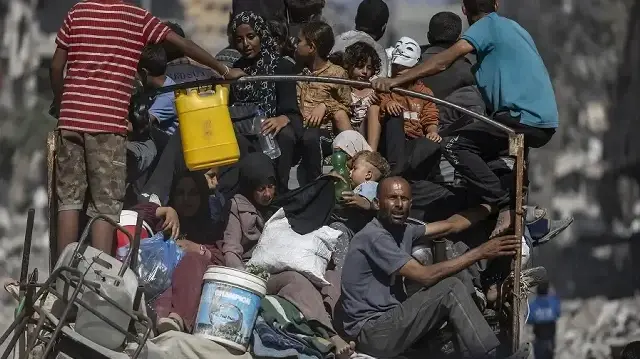Gaza's environmental collapse: two years of Israeli assault leaves ecosystem in ruins

UN data reveals the Israeli offensive in Gaza has caused an environmental catastrophe, with water, food, and agricultural systems in total collapse. A Palestinian environmental activist states Israel is using essential resources as "war weapons," leading to irreversible damage to farmland and ecosystems, with public health crises emerging from the rubble.
The two-year Israeli military operation in Gaza has resulted in a severe environmental and public health crisis, with UN reports detailing the systematic destruction of the enclave's ecosystem. The assault has not only claimed tens of thousands of lives but has also brought agricultural, fishing, and livestock activities to a complete halt, creating a desperate struggle for survival for the displaced population.
Collapse of Water and Sanitation Systems
Gaza's water infrastructure has been decimated, with storage capacity dropping by 84% and wastewater treatment plants becoming inoperable. According to UNEP and WHO data, 97% of Gaza's groundwater is now undrinkable due to seawater intrusion and nitrate pollution. The sanitation collapse has triggered dramatic spikes in disease; cases of watery diarrhea have increased 36-fold, while Hepatitis A cases have surged by a staggering 384-fold, with acute respiratory infections and diarrhea dominating the health landscape.
Destruction of Agriculture and Biodiversity
Satellite analysis by UNEP shows near-total destruction of Gaza's agricultural base and natural habitats by May 2025. The findings indicate 97% of tree cover, 82% of annual crops, and 75% of arable land were wiped out. Irrigation systems, greenhouses, and storage facilities were largely destroyed, forcing 85% of farmers to abandon their livelihoods. The assault has also devastated local wildlife, eradicating endemic plant species and causing a severe decline in waterbirds and pollinators.
Coastal Ecocide and Toxic Debris
The coastal environment has suffered irreparable harm, with 92% of infrastructure destroyed. This has led to 130,000 cubic meters of raw sewage being discharged daily into the Mediterranean, causing bacterial levels to reach 60 times WHO safety limits. Fish species have plummeted from 35 to just nine, destroying the fishing industry. Furthermore, the conflict has generated 61 million tons of debris, 11% of which contains hazardous materials like asbestos, creating a long-term toxic legacy.
Air Pollution and Use of Banned Materials
Air quality in Gaza has deteriorated drastically, with PM2.5 concentrations reaching up to 100 times WHO limits in some areas, exacerbated by the burning of waste and targeted fuel depots. Abeer Butmeh, coordinator of the Palestinian Civil Society Environmental Network, told Anadolu that Israel's use of heavy metals and banned chemicals is causing long-term, often irreversible, damage to the environment. "We can see that a huge amount of trees are dry as a result of the weapons, as a result of the high salinity of the soil," she said, emphasizing that Israel is using water, food, and energy as "war weapons."
Reklam yükleniyor...
Reklam yükleniyor...







Comments you share on our site are a valuable resource for other users. Please be respectful of different opinions and other users. Avoid using rude, aggressive, derogatory, or discriminatory language.